The bigger, whiter and more conservative the church, the more likely its members are to believe and share conspiracy theories, according to a new survey by LifeWay.
“Christian churches resolve to be places focused on the truth,” said Scott McConnell, executive director of Lifeway Research, in remarks accompanying the report. “Yet, half of pastors hear the spread of assumptions about plots often. This is a startling disconnect.”
LifeWay cited the Merriam-Webster Dictionary definition of conspiracy theory as “a theory that explains an event or set of circumstances as the result of a secret plot by usually powerful conspirators.”
 Clergy leading congregations of 250 or more were most likely (61%) to report hearing church members sharing conspiracy theories. White pastors (50%) were more likely than their Black counterparts (34%) to say they frequently hear parishioners repeating such beliefs, LifeWay Research reported.
Clergy leading congregations of 250 or more were most likely (61%) to report hearing church members sharing conspiracy theories. White pastors (50%) were more likely than their Black counterparts (34%) to say they frequently hear parishioners repeating such beliefs, LifeWay Research reported.
“At this time, it appears more of the theories are traveling in politically conservative circles, which corresponds to the higher percentages in the churches led by white Protestant pastors,” McConnell explained.
The survey has tapped into a vein of American thought that is much, much deeper than many suspect, researchers say.
Washington Post opinion contributor Brian Klaas recently noted that the mob that stormed the U.S. Capitol on Jan. 6 had more than loyalty to Donald Trump in common. Many of them, he said, “shared another crucial trait: They were conspiracy theorists. And while hundreds of people stormed the Capitol, there are millions of Americans who share their views. There is no doubt: The United States has a serious problem with pathological political delusions.”
The chances of finding a solution look slim, Klaas wrote. “Psychologists and political scientists have been interested in conspiracy theories for decades, but their research has taken on new urgency. And what is clear from their findings is this: Once people have gone far enough down the rabbit hole of conspiratorial thinking, it can be nearly impossible to get them back out.”
The LifeWay Research survey sheds light on just how many have traveled that path in recent years.
Overall, the study found that 49% of U.S. Protestant pastors “say they frequently hear members of their congregation repeating conspiracy theories they have heard about why something is happening in our country.”
Another 47% disagree with that assessment in their churches, including 26% who strongly disagree, saying they do not often hear church members sharing such ideas.
Researchers also learned that pastors age 65 and older were the least likely to say they hear church members sharing conspiracy theories.
LifeWay Research pointed to a possible irony uncovered in the survey. “While half of pastors note they frequently hear their church members sharing conspiracy theories, a previous study found church members may not be sharing the gospel that frequently.”
The organization noted that one of its 2019 surveys found that 55% of Protestant churchgoers said they had not shared how to become a Christian with another person in six months.
“Before returning to heaven, Jesus appealed to his followers to share what they had seen and heard,” McConnell said. “Passing along these eye-witness accounts of Jesus’ teaching and his death, burial and resurrection is the mission of the church. Instead, many church members are sharing things that might be, could happen or sound possible. One is a firm message of hope, and the other a shaky message of fear.”


